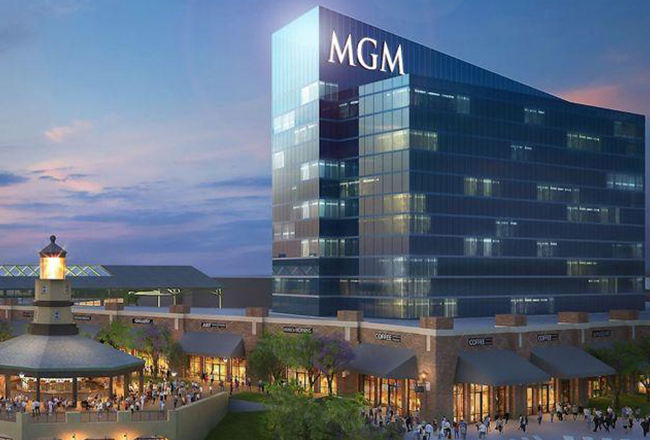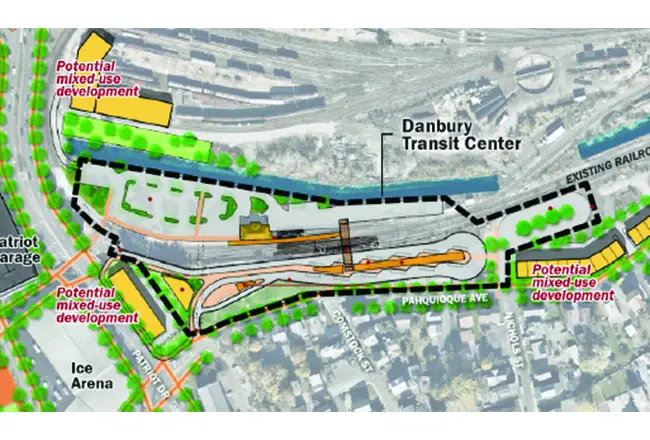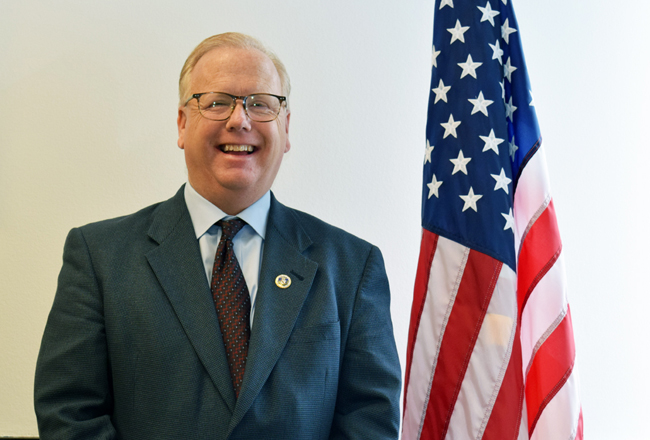The controversial plan to bring a casino to downtown Bridgeport”™s Steelpointe Harbor is dead ”” for now. But it”™s an issue that”™s likely to come up again in the next legislative session, as proposed operator MGM Resorts indicated it was hardly ready to throw in the towel.
“A year ago, the bill never received a floor vote,” MGM Resorts and developer RCI Group said in a joint statement. “This year it passed the House. That is significant. We realize that change is hard and takes time, and we respect the delegations”™ preference not to dominate debate with this issue with much to accomplish in a short time in the session”™s final hours.”
Indeed, the state Senate failed to call a vote on the issue as its session wound down on May 9. The House narrowly approved the bill on May 4 by a 77-73 vote. The bill called for authorizing a study to bring a new casino to the state, with Bridgeport being the most likely site.

A large part of the controversy stems from the state”™s arrangements with its two existing casinos: Foxwoods Resort Casino, operated by the Mashantucket Pequot Tribal Nation in Mashantucket, and Mohegan Sun, operated by the Mohegan Tribe in Uncasville. The tribes operate the casinos under exclusive revenue-sharing agreements that require them to pay 25 percent of their slot machine revenues to the state. That amount came to $270.7 million last year, a 1.8 percent increase over 2016”™s $265.9 million.
In April, the tribes presented a report arguing that the state would “be the biggest loser” if another casino was approved, saying that their payments could be put into escrow until litigation was resolved.
“Should the state lose that litigation it could result in an upfront permanent loss of more than $1 billion in revenue over a four-year period ($270.7 times 4) while potential casino sites are identified, bids and proposals are submitted to the state, the state reviews proposals and issues a license and a casino is eventually constructed,” according to the report.
Those revenue sharing payments would “at best be offset by approximately $180.2 million in gaming tax payments by the fourth casino ”” assuming that the commercial casino is taxed at 25 percent of gross gaming revenues ”” which is equal or higher than the tax rates being paid by most other resort casinos in the United States (e.g, Nevada, New Jersey, Mississippi, Michigan, and Massachusetts),” the report added.
The result would be a permanent net reduction of state revenue of $90.5 million annually, even after a Bridgeport casino is fully operational, according to the report. It went on to say that the loss was “the most optimistic scenario.”
In 2015 the tribes formed a partnership, MMCT Venture, to allow them to work together to build a third, jointly owned casino in Connecticut to help save millions in state gaming revenue that potentially would be lost to Massachusetts, where MGM is creating a $960 million resort casino that”™s scheduled to have its grand opening Aug. 24.
MMCT”™s third casino would be in East Windsor, but to date the U.S. Department of the Interior has refused to rule on changes to the gaming compact the tribes have with Connecticut; construction cannot begin until the project is entered into the Federal Register.
MMCT spokesman Andrew Doba also cited the potential lost revenue to the state if the Bridgeport project went forward.
“Let”™s be clear,” Doba said. “The only thing (the Connecticut) bill accomplishes is to place in jeopardy nearly $1.4 billion in state tax revenue, $328 million of which is slated to go directly to cities and towns.”
“The tribes support studying this issue,” Doba added. “With an open and active investigation by the Inspector General into what happened at the Department of Interior, the only right course of action is to table this bill.”
And that is what happened late on May 8, when supporters in the Connecticut Senate admitted that they would not have the votes necessary to endorse House Bill 5305, “An Act Concerning a Request for Proposals to Qualify an Entity to Develop a Casino Gaming Facility in the State,” which stated that an approved casino bid would need to include an investment of at least $500 million and the creation of 2,000 jobs. H.B. 5305 would also have required the casino operator to make a $5 million deposit for each application.
Perhaps not surprisingly, the Bridgeport legislative delegation expressed support for the bill, saying that it would “help create countless opportunities for Connecticut.
Bridgeport Mayor Joe Ganim endorsed the bill, as did the Bridgeport, Stratford and Trumbull Chambers of Commerce and the Bridgeport Regional Business Council, saying it would result in annual payments of $8 million to Bridgeport and $4.5 million to surrounding communities.
“When someone knocks on our door with $675 million in hand intent on investing in our community, it would be shortsighted and counterproductive to turn them away without a second thought,” BRBC President and CEO Mickey Herbert told legislators at a public hearing last month.
But other business leaders weren”™t so sure, including Joe McGee, vice president, public policy and programs at The Business Council of Fairfield County in Stamford. “Why put at risk guaranteed income from the two casinos in exchange for the one in Bridgeport?” he asked, saying the bill “never should have been put before the legislature” without more detailed economic and competitive analyses being completed.
On April 30, the Business Council of Fairfield County took 22 executives to meet with MGM representatives, Ganim, Herbert, and other supporters of the project. While generally impressed by what they were told, McGee said too many questions remained.
“They told us that they were planning to have 1,500 parking spots ”” which seemed really low,” he said. “We said, ”˜Are you sure you don”™t mean 15,000?”™ and they said, ”˜No, 1,500.”™ That doesn”™t meet the smell test.”
He noted that the Steelpointe Harbor casino, as first announced on Sept. 18, would include a 300-room hotel; a 100,000-square-foot casino with 2,000 slot machines and 160 table games; 30,000 square feet of retail space; a 20,000-square-foot entertainment venue with a 700-seat theater; and 60,800 square feet of dining space that would include five restaurants and six bar and lounge locations.
“How do you accommodate all of that with 1,500 parking spaces?” McGee said, adding that he believed the figure was deliberately kept low to impact traffic studies.
Connecticut Business & Industry Association Economist Pete Gioia also expressed doubts about the traffic issue. “I-95 is bad enough,” he declared. “Putting a casino there could make it much worse.”
Gioia also wondered how Steelpointe could make up for the revenue lost from the tribes. “I don”™t see how it”™s possible for one casino in Bridgeport to supplant that,” he said.
He also questioned the jobs impact of the project. “Obviously you”™re going to have an initial impact from construction and hiring at the casino,” he said. “But the multiplier effects of construction and operating a casino in terms of creating jobs is actually quite weak when compared to other sectors.”
McGee also wondered if competition from Massachusetts and New York wouldn”™t eventually have a negative impact on Steelpointe. “Bridgeport needs to do itself a favor and make sure it”™s not buying a pig in a poke,” he said. “Right now, there”™s a lot of political rhetoric going on, but there”™s a long way to go here. A lot more work needs to be done before we blow up the compact” with the tribes.





















